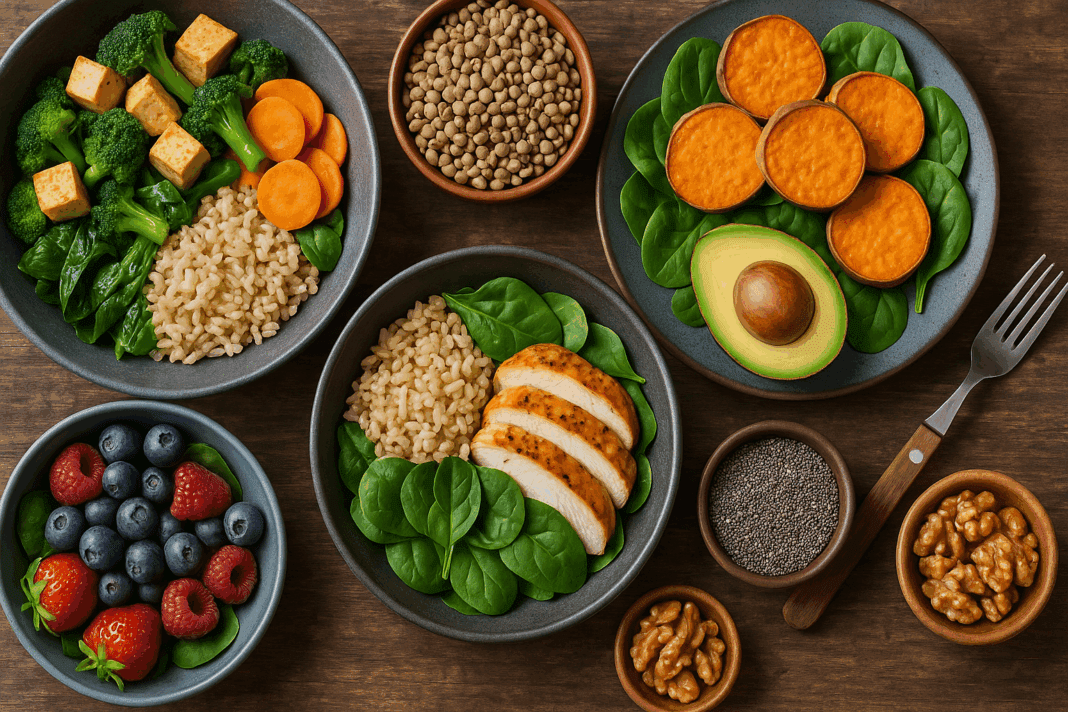Nourishing Strength: Why Nutrition Matters for Men’s Energy, Focus, and Longevity
For many men, maintaining strength and stamina is about more than just staying active—it starts with the fuel they put into their bodies. A well-balanced diet isn’t just a recommendation; it’s a foundational pillar for a healthy life. From managing energy dips during long workdays to enhancing physical performance and preventing chronic disease, nutrition plays a central role. Healthy meals for men are more than just calorie-counting; they’re about choosing whole, nutrient-rich foods that support muscle function, cardiovascular health, cognitive clarity, and overall vitality.
Despite the abundance of dietary trends targeting the male population—from high-protein bulking diets to intermittent fasting plans—the truth is that optimal male nutrition hinges on balance. It’s not about exclusion or extremes, but about incorporating a variety of high-quality foods that work together to nourish the body. The best healthy meal ideas for men are designed to be sustainable, satisfying, and rooted in real science—not fads.
This article dives deep into the anatomy of healthy eating for men, offering expert-backed strategies, practical tips, and energizing meal ideas that fit into even the busiest lifestyles. Whether you’re an athlete, a busy professional, or simply trying to take better care of your health, you’ll find valuable, actionable insight into how healthy meals for guys can fuel both your day and your long-term wellness.
You may also like: Smart, Simple Recipes for a Balanced Diet: Expert-Backed Healthy Food Dishes to Support Everyday Wellness
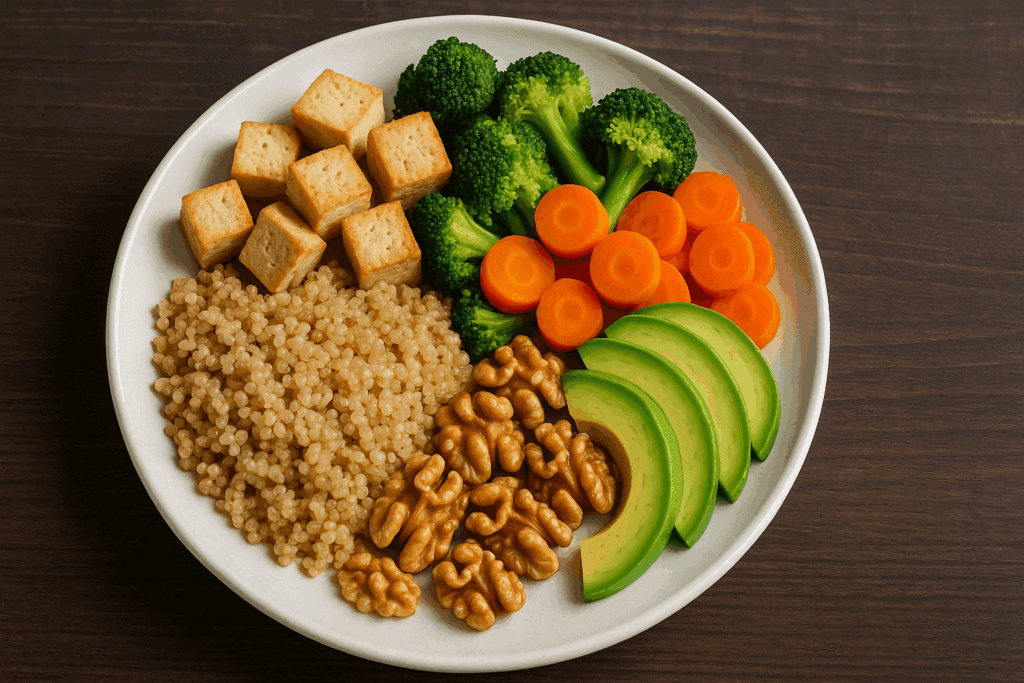
What Makes a Meal “Healthy” for Men? The Science Behind the Plate
A healthy meal isn’t just about being low in fat or carbs—it’s about the full nutritional profile. For men, this includes adequate amounts of protein to support muscle repair and maintenance, complex carbohydrates for sustained energy, healthy fats for hormone function, and an array of vitamins and minerals that regulate everything from heart rate to immune function.
Protein, particularly, is often emphasized in healthy recipes for guys—and for good reason. Men tend to have higher muscle mass than women, meaning they require more protein to maintain their physique and prevent muscle loss, especially with age. But it’s not just about quantity. The quality of protein matters too. Lean sources like legumes, quinoa, tofu, lentils, tempeh, and edamame are excellent for men looking to support muscle without excess saturated fat.
Carbohydrates have often been demonized in the world of men’s health, but they are essential—especially complex carbs like sweet potatoes, brown rice, oats, and whole grains. These fuel your workouts, stabilize blood sugar, and keep you full longer. Healthy fats, particularly omega-3 fatty acids from flaxseeds, walnuts, and chia seeds, are critical for brain health and managing inflammation—key issues in men’s aging and cardiovascular health.
In short, the most effective healthy meals for men are nutritionally complete. They contain a balance of macronutrients, are rich in fiber, and include a variety of colorful vegetables and whole foods that support the unique physiological needs of men.
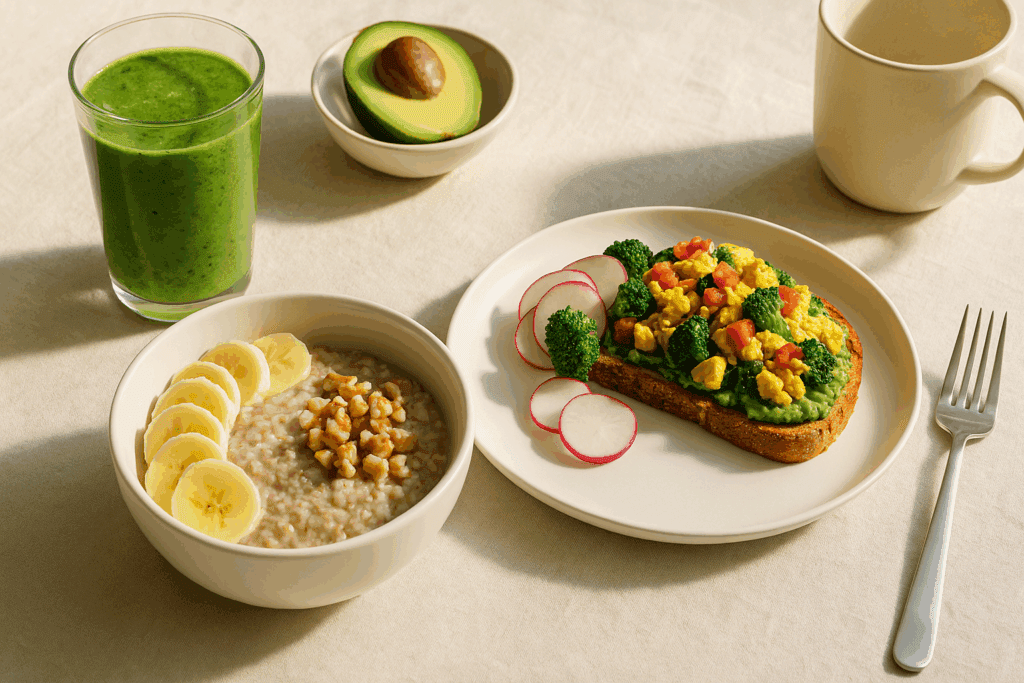
Daily Energy Starts with Breakfast: Healthy Meal Ideas for Men to Fuel the Morning
Men often skip breakfast in favor of a rushed start to the day, but this habit can lead to low energy, poor concentration, and late-day cravings. A solid breakfast can set the tone for your metabolic function and mental clarity throughout the day. Fortunately, there are many healthy meal ideas for men that are both quick and nourishing.
A plant-based protein smoothie with frozen berries, spinach, flaxseed, and a scoop of protein powder offers a complete macronutrient profile and is easy to prep in under five minutes. Another great option is steel-cut oats topped with walnuts, banana slices, and a drizzle of almond butter. This combination provides slow-burning carbs, healthy fats, and plant-based protein—ideal for a steady morning.
For those who prefer savory over sweet, scrambled tofu with vegetables and avocado on whole-grain toast is a powerhouse breakfast. It provides fiber, protein, and monounsaturated fats, all of which are known to support satiety and reduce the risk of heart disease.
Integrating these kinds of healthy meals for guys into your routine can improve focus, reduce mid-morning crashes, and even support healthier food choices throughout the rest of the day.
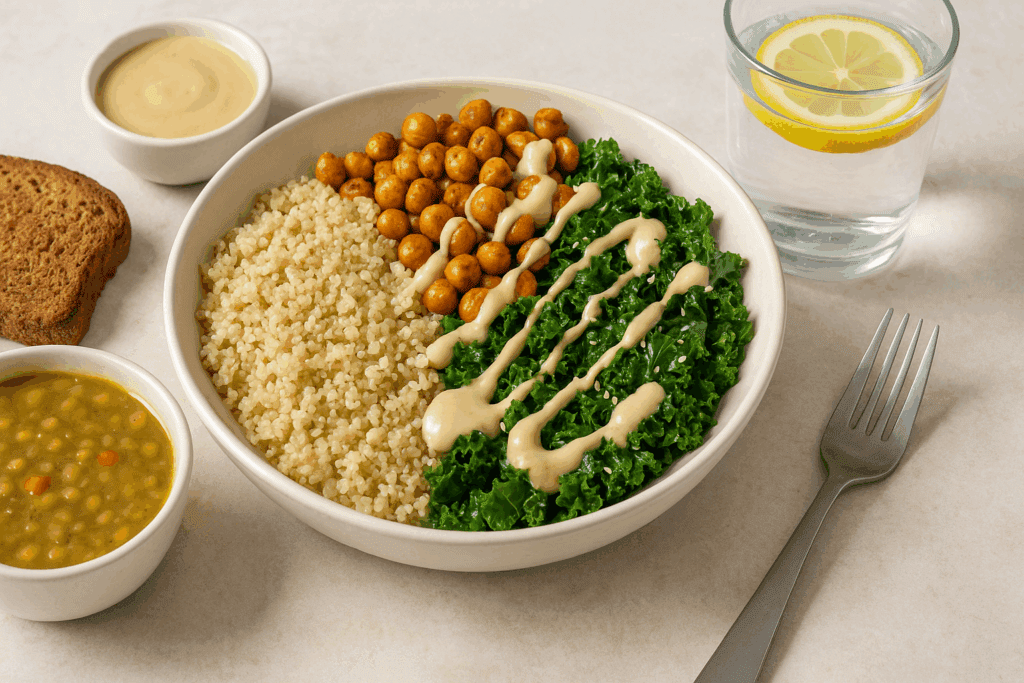
Midday Muscle: Healthy Lunches That Power Performance and Prevent Slumps
Lunch is where many men begin to falter nutritionally—either skipping it altogether or opting for fast food and overly processed options. A well-planned lunch isn’t just fuel—it’s your body’s second chance at nourishment during the day. It’s where healthy meals for men can make a real difference in energy, mood, and productivity.
One tried-and-true option is a grain bowl built with brown rice or quinoa, roasted chickpeas, kale, avocado, and tahini dressing. This meal hits every nutritional note: high in fiber, rich in healthy fats, and loaded with plant-based protein. Another strong contender is a wrap made with a whole-grain tortilla filled with hummus, roasted vegetables, and a sprinkle of hemp seeds. It’s portable, satisfying, and easy to batch-prep.
Healthy recipes for guys don’t have to be complicated. Even a hearty lentil soup with a side of whole-grain toast and a green salad offers a complete, nutrient-dense meal that supports heart health, satiety, and digestion. These meals stabilize energy, reduce the likelihood of energy crashes, and contribute to long-term wellness.
For those working physically demanding jobs or with high activity levels, adding a side of fruit or a serving of edamame can enhance the meal’s glycemic balance and boost endurance.

Satisfying Dinners for Recovery, Repair, and Restful Sleep
Evening meals serve a different purpose: they’re about recovery, repair, and setting the stage for good sleep. For men, especially those who exercise regularly or work long hours, dinner is a critical opportunity to refuel. The best healthy meals for guys in the evening include anti-inflammatory ingredients and foods that promote restful sleep and muscle recovery.
A stir-fry of tofu, broccoli, bell peppers, and carrots with a garlic-ginger sauce over brown rice is an excellent, protein-packed dinner that’s full of antioxidants and minerals like magnesium and potassium. These micronutrients help with muscle relaxation and reduce blood pressure—essential benefits after a high-stress day.
Another great idea is a hearty chili made with black beans, kidney beans, tomatoes, and sweet potatoes. When served with a side of cornbread made with whole grains, it becomes a fiber-rich, high-protein dinner ideal for satiety and gut health. For men looking to lean down or manage weight, dinners like these are filling without being overly caloric.
Many healthy meal ideas for men at dinnertime include cruciferous vegetables like Brussels sprouts and cabbage, which support testosterone balance and help the liver detox naturally. These additions also provide fiber and phytonutrients that contribute to long-term wellness.
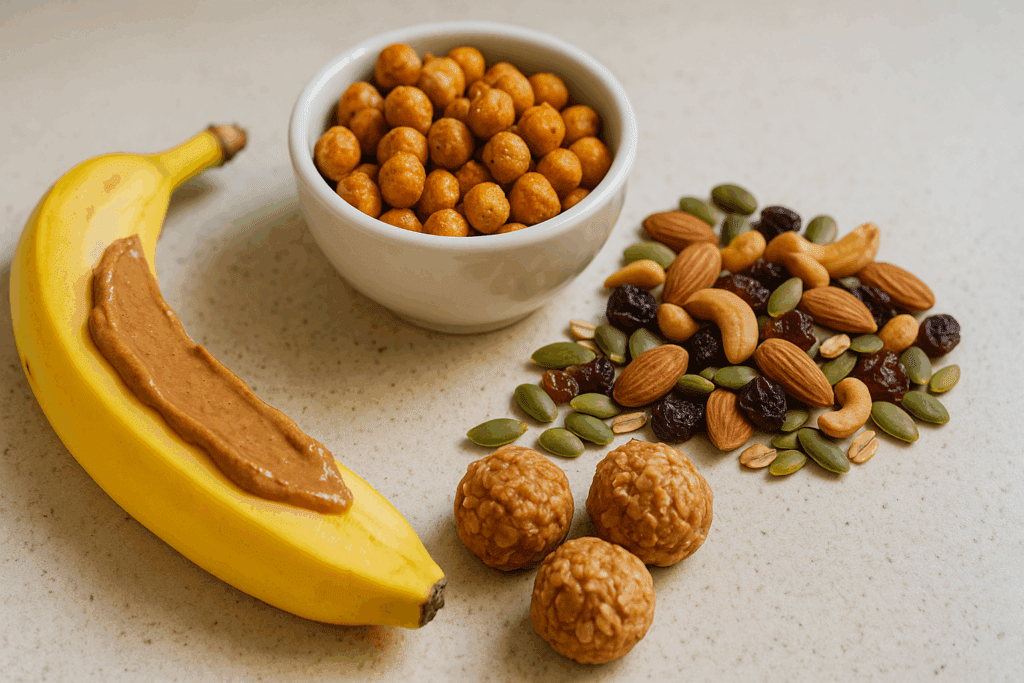
Snacks with Substance: Smart Choices for Busy Lifestyles
Snacking is often overlooked, but it plays a major role in sustaining energy between meals—especially for men with fast metabolisms or physically demanding routines. The key is to choose snacks that stabilize blood sugar and prevent overeating later in the day.
One of the simplest healthy snacks is a banana with almond butter. It’s portable, requires no prep, and provides a balance of carbs and healthy fat. A handful of roasted chickpeas or trail mix with pumpkin seeds and raisins delivers a crunchy, satisfying bite that supports muscle and brain function.
Healthy recipes for guys often overlook snacks, but even something like homemade protein bites made from oats, dates, and peanut butter can deliver nutrients in a convenient form. These support workout recovery and give you a quick energy lift before your next meal.
Snacks like sliced veggies with hummus or a cup of plain Greek-style plant yogurt with berries provide a cooling, hydrating complement to a day of activity. Whether you’re at the office, in the gym, or on the go, building smart snack habits contributes to the bigger picture of balanced, healthy meals for men.
Supplements or Whole Foods? Building a Foundation Through Nutrition
Many men turn to protein powders, multivitamins, and performance boosters in pursuit of strength and stamina. While supplements can fill nutritional gaps, they are not a substitute for whole, balanced meals. The foundation of any health strategy should be built on nutrient-dense foods.
Plant-based proteins, legumes, leafy greens, seeds, and whole grains can deliver all the essential amino acids and micronutrients men need when combined strategically. For example, pairing lentils with rice or hummus with whole-grain bread ensures complete proteins that support muscle function and recovery.
Supplements like B12, omega-3s (from algae sources), or vitamin D can play a role when dietary intake is limited or exposure to sunlight is inadequate. However, the best healthy meal ideas for men emphasize food-first strategies that provide fiber, phytonutrients, and antioxidants—elements that are difficult to extract into pill form.
Choosing whole foods not only improves digestion and energy metabolism but also fosters a deeper connection to the body’s needs and satiety signals. This mindful approach to eating is what transforms short-term diet fixes into long-term wellness strategies.
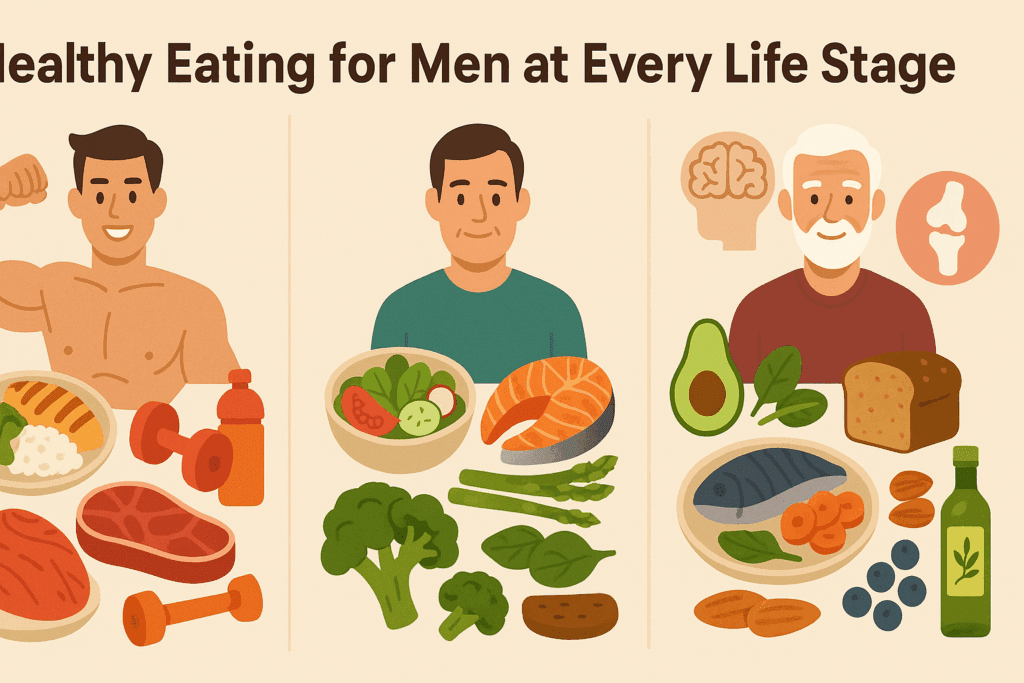
Healthy Eating for Men at Every Life Stage
Nutritional needs shift throughout a man’s life. A 25-year-old athlete will have very different requirements than a 55-year-old managing blood pressure or cholesterol. Still, the core principles of healthy meals for men remain consistent: balance, variety, and nutrient density.
Younger men often focus on building muscle and enhancing performance. In this stage, healthy meals for guys may include higher overall calorie intake, particularly from complex carbs and plant-based proteins. Recovery and hormonal balance are key, and meals should be rich in magnesium, zinc, and omega-3s.
Middle-aged men often prioritize heart health, weight maintenance, and metabolic resilience. Reducing sodium, focusing on plant-based fats, and increasing soluble fiber can help manage cholesterol and blood pressure. Healthy meal ideas for men in this life stage might include bean stews, hearty salads with seeds and avocado, and calcium-rich leafy greens.
Older men benefit from meals that support brain health, joint mobility, and digestive ease. Incorporating anti-inflammatory herbs, fermented foods for gut health, and hydration-rich options like soups and smoothies can make a significant difference in quality of life.
At every stage, food is both fuel and medicine. The right choices can enhance longevity, sharpen cognition, and keep the body strong and active.
Real-World Strategies for Sticking with Healthy Meals for Guys
Knowing what to eat is only part of the challenge. Implementing healthy meals for men in real life—amid demanding jobs, family obligations, and limited time—requires planning and mindset.
Batch cooking once a week is one of the most effective tools. Preparing components like grains, roasted vegetables, and beans in advance allows for easy meal assembly throughout the week. Having a few go-to healthy recipes for guys that you genuinely enjoy also makes the habit more sustainable.
Investing in quality food storage containers, using a meal delivery service focused on clean, plant-forward meals, or subscribing to a CSA (community-supported agriculture) can also help keep healthy ingredients accessible.
Above all, men benefit from seeing food not as a restriction but as a resource. Healthy eating doesn’t mean deprivation—it means fueling your strength, your work, and your life
Frequently Asked Questions: Healthy Meals for Men
1. How can men optimize their nutrition for high-stress, high-demand jobs without relying on takeout?
Men working long hours often fall into the convenience trap, relying on fast food or energy drinks to power through their day. Instead, preparing healthy meals for men in advance—even just twice a week—can radically improve mental stamina and physical resilience. Focus on prepping components like whole grains, roasted vegetables, and plant-based proteins such as lentils or tofu. These can be quickly combined into bowls or wraps with minimal effort, offering much better nutritional support than processed options. Prioritizing nutrient-dense foods helps regulate cortisol, the stress hormone, while sustaining energy throughout high-demand workdays, making healthy meal ideas for men a long-term investment in both productivity and health.
2. What’s the biggest mistake men make when trying to eat healthier?
A common mistake is focusing exclusively on protein, often at the expense of fiber, micronutrients, and healthy fats. While protein is vital—especially for active men—many overlook the role of gut health, cardiovascular support, and hormone balance that comes from a more diverse diet. Healthy meals for guys should include legumes, seeds, leafy greens, and fermented foods to round out nutrition. Eating the same “bro” meal of chicken, rice, and broccoli every day may hit some macro targets, but it fails to address broader wellness goals. Variety is not just enjoyable—it’s essential for achieving optimal nutrient synergy in healthy recipes for guys.
3. Can healthy meals for men support testosterone levels naturally?
Yes, food can have a significant effect on testosterone production, particularly when meals are rich in zinc, magnesium, and healthy fats. Healthy meals for guys that include pumpkin seeds, leafy greens, avocados, and legumes help regulate hormonal pathways without the need for supplements. Processed foods high in trans fats and refined sugars have been linked to hormonal disruption, so cutting those out can also improve testosterone levels over time. Incorporating whole foods with anti-inflammatory properties can reduce oxidative stress, another factor associated with declining testosterone. For men seeking to support hormone health naturally, healthy recipes for guys can be tailored to include these specific nutrients on a regular basis.
4. What are some overlooked plant-based ingredients men should incorporate into their diets?
While tofu, quinoa, and lentils are popular in many healthy meals for men, there are several lesser-known plant-based ingredients that deserve attention. Tempeh, for example, offers not only complete protein but also beneficial probiotics that support gut and immune function. Black garlic, often used in Asian cuisine, has powerful antioxidant properties and a rich flavor profile that enhances healthy recipes for guys. Seaweed varieties like dulse or wakame provide iodine and trace minerals crucial for thyroid health. Including these ingredients can elevate the nutritional complexity of healthy meal ideas for men while keeping meals exciting and flavorful.
5. How can men make healthy meals more satisfying without overeating?
Satisfaction is not solely about volume—it’s also about nutrient balance, flavor, and satiety signals. Healthy meals for guys should combine fiber-rich carbohydrates, quality fats, and plant proteins to engage all senses and leave you feeling nourished. Adding ingredients like avocado, roasted nuts, or tahini can help increase satiety by slowing digestion. Experimenting with umami flavors—like mushrooms, nutritional yeast, or tamari—can also create more sensory satisfaction. When healthy meals for men are thoughtfully composed to include multiple textures and tastes, overeating becomes less likely because the body receives clear fullness cues.
6. What role does hydration play in complementing healthy meals for men?
Hydration is often underestimated in the context of nutrition, yet it plays a vital role in digestion, nutrient transport, and muscle function. Even the best healthy meals for men can’t fully support performance or recovery if dehydration is present. Men should aim to drink water consistently throughout the day, not just around workouts. Electrolyte-rich beverages made from natural sources—like coconut water or smoothies blended with leafy greens and sea salt—can provide both hydration and nutritional synergy. In the context of healthy recipes for guys, hydration also supports metabolism and prevents the fatigue that’s often mistaken for hunger.
7. Are there cultural influences that shape how men approach healthy eating?
Absolutely—cultural perceptions of masculinity often shape dietary choices. For instance, the association of meat with strength can cause some men to dismiss plant-forward meals as insufficient. However, the rise of plant-based athletes and health-conscious male role models is shifting this narrative. Emphasizing healthy meal ideas for men that are hearty, bold in flavor, and nutritionally complete can help break stereotypes around what constitutes “manly” food. By redefining what strength looks like—from heavy plates to smart fuel—more men are embracing healthy meals for guys that align with both performance and longevity.
8. What psychological strategies can help men stick to healthy eating habits?
Consistency often hinges on mindset, not just meal prep. Building sustainable habits around healthy meals for guys involves small, repeatable actions—like grocery planning, mindful eating, and setting realistic goals. Men may benefit from tracking how they feel after different meals to develop internal motivation rather than relying on external pressure. Additionally, using behavioral cues—such as setting calendar reminders to prep or choosing accountability partners—can make healthy recipes for guys more routine and less reliant on willpower. Long-term adherence tends to come from systems, not just inspiration, and these systems can be tailored to each individual’s lifestyle and priorities.
9. How can single men or college students eat healthy on a limited budget?
Budget constraints don’t have to limit nutrition. Many healthy meals for men can be made using inexpensive staples like oats, canned beans, lentils, brown rice, and frozen vegetables. Buying in bulk, shopping seasonal produce, and cooking in larger batches for leftovers can significantly reduce costs. Healthy recipes for guys don’t need exotic ingredients or expensive superfoods to be effective—they need smart combinations of affordable, nutrient-dense foods. Even with minimal kitchen equipment, dishes like chili, stir-fries, or grain bowls can be made quickly and stored for later. Prioritizing simplicity and nutrition over complexity helps ensure that healthy meals for guys remain accessible at any income level.
10. What trends are shaping the future of healthy meals for men?
The future of healthy meals for men is being shaped by a growing interest in personalized nutrition, environmental sustainability, and plant-based innovation. Wearable tech and DNA-based diet apps are offering more customized insights into how individuals process nutrients, influencing how men choose foods to meet their goals. Meanwhile, eco-conscious eating is pushing healthy recipes for guys toward more plant-based, locally sourced ingredients that minimize environmental impact. Innovations in plant protein—such as fermented pea protein or lab-grown meat alternatives—are also making it easier for men to diversify their meals without sacrificing taste or texture. As these trends converge, we can expect even more advanced and customized healthy meal ideas for men that prioritize both personal and planetary health.
Conclusion: The Power of Smart Nutrition—Healthy Meals for Men That Go Beyond the Plate
The journey toward lasting energy, strength, and wellness begins with what you put on your plate. Healthy meals for guys are not just about protein or calorie counting—they’re about creating a balanced, intentional way of eating that aligns with your life’s goals. When men prioritize nutrient-dense, whole-food-based meals, they give their bodies the tools they need not only to perform but to thrive.
From energizing breakfasts to restorative dinners and everything in between, healthy meal ideas for men can support endurance, improve focus, reduce disease risk, and elevate overall well-being. By understanding your unique nutritional needs and crafting meals that honor those requirements, you build a foundation that fuels your performance, protects your health, and supports your best self—at any age.
Ultimately, food is more than sustenance. It’s a strategy. With the right approach to healthy meals for men, you can harness the full potential of nutrition to power a life of strength, clarity, and purpose.
Was this article helpful? Don’t let it stop with you. Share it right now with someone who needs to see it—whether it’s a friend, a colleague, or your whole network. And if staying ahead on this topic matters to you, subscribe to this publication for the most up-to-date information. You’ll get the latest insights delivered straight to you—no searching, no missing out.
nutrition for men’s health, high protein plant meals, energy-boosting foods for men, balanced diet for active lifestyles, men’s meal prep ideas, muscle recovery nutrition, men’s wellness meals, whole food diet for men, heart-healthy plant-based meals, anti-inflammatory foods for men, fitness meal planning, plant-powered performance, nutrient-dense dinners, sustainable healthy eating, strength-focused diet, mindful eating for men, male metabolism support, clean eating strategies, hormone health nutrition, functional foods for men
Further Reading:
A List of 50 Super Healthy Foods
15 Foods to Help Naturally Boost Your Energy Levels
22 High-Protein Breakfasts That Actually Keep You Full
Disclaimer
The information contained in this article is provided for general informational purposes only and is not intended to serve as medical, legal, or professional advice. While NewsHealthWatch strives to present accurate, up-to-date, and reliable content, no warranty or guarantee, expressed or implied, is made regarding the completeness, accuracy, or adequacy of the information provided. Readers are strongly advised to seek the guidance of a qualified healthcare provider or other relevant professionals before acting on any information contained in this article. NewsHealthWatch, its authors, editors, and contributors expressly disclaim any liability for any damages, losses, or consequences arising directly or indirectly from the use, interpretation, or reliance on any information presented herein. The views and opinions expressed in this article are those of the author(s) and do not necessarily reflect the official policies or positions of NewsHealthWatch.

